Aspiring to contribute to cutting-edge research at the Indian Institute of Science (IISc)? Joining the PhD program is your gateway. Competition is fierce. Understanding the requirements for the 2025 admissions cycle is crucial. Beyond a strong academic record and relevant Master’s degree, specific GATE scores or NET qualifications are often necessary. Moreover, a compelling research proposal demonstrating alignment with faculty expertise significantly enhances your application. We will explore these prerequisites in detail, providing clarity on eligibility criteria, application procedures. The evaluation process, empowering you to craft a competitive application for IISc’s prestigious PhD program.

Understanding the IISc PhD Application Landscape
Applying for a PhD at the Indian Institute of Science (IISc) Bangalore is a competitive yet rewarding endeavor. The institute is renowned for its cutting-edge research and rigorous academic environment. Before diving into the specifics for the 2025 admissions, it’s crucial to comprehend the overall application process. This involves identifying the research area that aligns with your interests, understanding the eligibility criteria, preparing the necessary documents. Navigating the selection process.
Key Dates and Deadlines for 2025 Admissions
Staying on top of the essential dates is essential. While the official notification for the 2025 academic year will be released by IISc, based on previous years’ trends, you can expect the following timeline:
- Application Portal Opens: Typically in February/March
- Application Deadline: Usually in April/May
- Entrance Exams/Interviews: May to July
- Declaration of Results: June/July
It is highly recommended to frequently check the official IISc website for the latest and most accurate data.
Eligibility Criteria: Meeting the Mark
The eligibility criteria for PhD admissions at IISc Bangalore are specific to each department. But, some general requirements apply across most departments:
- Educational Qualification: A Master’s degree in a relevant discipline is typically required. Some departments also accept Bachelor’s degrees with exceptional academic records.
- Minimum Marks: A minimum of 60% marks or equivalent grade in the qualifying degree is generally expected.
- National Level Exams: Qualifying in national level exams like GATE, NET (JRF), or equivalent is often mandatory. The specific exam requirements may vary depending on the department.
Specific Department Requirements: It’s imperative to check the specific requirements of the department you are applying to. For example, the Department of Computer Science and Automation (CSA) might have different requirements compared to the Department of Mechanical Engineering. Some departments might prioritize candidates with prior research experience or publications.
Required Documents: Preparing Your Application Package
A well-prepared application package is crucial for making a strong impression. The following documents are typically required:
- Online Application Form: Filled out accurately and completely.
- Academic Transcripts: Official transcripts from all previous institutions attended.
- Degree Certificates: Provisional or degree certificates as proof of qualification.
- National Level Exam Scorecard: GATE/NET/equivalent scorecard.
- Statement of Purpose (SOP): A critical document outlining your research interests, motivations. Career goals.
- Letters of Recommendation (LORs): Typically, two to three letters of recommendation from professors or mentors who can assess your research aptitude.
- Curriculum Vitae (CV): A detailed CV highlighting your academic achievements, research experience, publications. Other relevant skills.
- Passport-sized Photograph: As per the specifications mentioned in the application guidelines.
Crafting a Compelling Statement of Purpose: The SOP is your opportunity to showcase your passion for research and explain why you are a suitable candidate for the program. Clearly articulate your research interests, previous experiences. How your skills align with the research being conducted at IISc. Mention specific faculty members whose research aligns with your interests.
Navigating the Selection Process: Entrance Exams and Interviews
The selection process typically involves a written test and/or an interview. Some departments may directly call candidates for an interview based on their application and national level exam scores.
- Written Test: The written test usually assesses your understanding of fundamental concepts in your chosen field. The syllabus is generally based on the undergraduate and postgraduate curriculum of the relevant discipline.
- Interview: The interview is a crucial part of the selection process. You will be assessed on your research aptitude, problem-solving skills. Communication abilities. Be prepared to discuss your research interests, previous projects. Future goals. Expect questions on fundamental concepts as well as more advanced topics related to your area of interest.
Preparing for the Interview: Thoroughly review your SOP, research experience. The research interests of the faculty in the department. Practice answering common interview questions and be prepared to discuss your research ideas in detail. Demonstrate your enthusiasm for research and your willingness to learn.
Understanding Different PhD Programs and Departments at IISc
IISc offers PhD programs across various departments, broadly categorized into:
- Engineering: Aerospace Engineering, Chemical Engineering, Civil Engineering, Computer Science and Automation, Electrical Communication Engineering, Electrical Engineering, Electronics Systems Engineering, Mechanical Engineering.
- Science: Biochemistry, Centre for Neuroscience, High Energy Physics, Inorganic and Physical Chemistry, Materials Engineering, Mathematics, Microbiology and Cell Biology, Molecular Biophysics Unit, Organic Chemistry, Physics, Solid State and Structural Chemistry.
- Interdisciplinary: Centre for Earth Sciences, Centre for Sustainable Technologies, Management Studies, etc.
Choosing the Right Department: Carefully consider your research interests and the expertise of the faculty in each department. Visit the departmental websites, read faculty profiles. Explore their research publications to identify the best fit for your academic goals.
GATE, NET. Other Qualifying Exams: What You Need to Know
Qualifying in national-level exams like GATE (Graduate Aptitude Test in Engineering) and NET (National Eligibility Test) is often a prerequisite for PhD admissions at IISc. The specific requirements vary depending on the department. For example, some departments might accept only GATE scores, while others might accept both GATE and NET scores. Some departments also consider other equivalent exams like JEST or CSIR-NET.
GATE vs. NET: GATE is an exam primarily for engineering and science graduates seeking admission to postgraduate programs in engineering, technology. Architecture. NET is conducted by the UGC (University Grants Commission) and CSIR (Council of Scientific and Industrial Research) for determining the eligibility of Indian nationals for the award of Junior Research Fellowship (JRF) and for lectureship/assistant professorship. For PhD admissions at IISc, JRF qualification is generally preferred.
Exam Preparation Strategies: Develop a strong foundation in the fundamental concepts of your chosen field. Practice solving previous years’ question papers and take mock tests to assess your preparation level. Focus on time management and accuracy. Consult with professors and seniors for guidance and advice.
Funding Opportunities and Scholarships
IISc offers various funding opportunities and scholarships to support PhD students. These include:
- Institute Fellowships: Most PhD students receive institute fellowships, which cover tuition fees and provide a monthly stipend.
- External Fellowships: Students can also apply for external fellowships from organizations like CSIR, UGC, DST. Other funding agencies.
- Project Assistantships: Some students may be offered project assistantships, which involve working on specific research projects and receiving a stipend.
Applying for Fellowships: Explore the various fellowship opportunities available and carefully review the eligibility criteria and application procedures. Prepare a strong application highlighting your academic achievements, research experience. Future goals. Seek guidance from your research advisor and mentors.
Life at IISc: A Glimpse into the Research Environment
IISc offers a vibrant and stimulating research environment. The campus is equipped with state-of-the-art facilities, including advanced laboratories, libraries. Computing resources. The institute fosters a culture of collaboration and innovation. Students have ample opportunities to interact with leading researchers, attend seminars and workshops. Participate in conferences.
Campus Life: IISc has a diverse and inclusive community. The campus offers a range of amenities, including hostels, dining halls, sports facilities. Cultural clubs. Students can participate in various extracurricular activities and social events. The location of IISc Bangalore provides easy access to the city’s cultural and recreational attractions.
Real-World Applications and Use Cases
The research conducted at IISc has significant real-world applications across various fields. For example:
- Engineering: Development of advanced materials, design of efficient energy systems, development of artificial intelligence algorithms. Creation of innovative technologies for healthcare and transportation.
- Science: Discovery of new drugs, understanding of fundamental biological processes, development of sustainable agricultural practices. Exploration of the universe.
Case Study: Consider the research being conducted in the Department of Electrical Engineering on developing smart grids. This research aims to improve the efficiency and reliability of power distribution systems, which has significant implications for reducing energy consumption and mitigating climate change. This aligns with global efforts toward sustainable energy solutions.
Tips for a Successful Application
Here are some key tips to increase your chances of getting admitted to the IISc PhD program:
- Start Early: Begin preparing your application well in advance of the deadline. This will give you ample time to gather the necessary documents, write a compelling SOP. Prepare for the entrance exams and interviews.
- Research Thoroughly: Research the different departments and faculty members to identify the best fit for your research interests.
- Tailor Your Application: Customize your SOP and other application materials to highlight your specific skills and experiences that are relevant to the department you are applying to.
- Seek Feedback: Ask professors, mentors. Peers to review your application materials and provide feedback.
- Prepare for the Interview: Practice answering common interview questions and be prepared to discuss your research ideas in detail.
- Be Persistent: The application process can be competitive, so don’t get discouraged if you face rejections. Learn from your experiences and keep trying.
IISc Bangalore: A Legacy of Excellence
IISc Bangalore stands as a beacon of scientific and technological advancement in India. Its rich history, coupled with its commitment to cutting-edge research, makes it a premier destination for aspiring researchers. Pursuing a PhD from IISc provides a unique opportunity to contribute to groundbreaking discoveries and shape the future of science and technology. With careful planning and dedicated preparation, you can increase your chances of joining this prestigious institution and embarking on a fulfilling research career.
Conclusion
The journey to an IISc PhD is rigorous, demanding dedication and foresight. As you prepare for the 2025 admissions, remember that a strong academic foundation, while crucial, is just the starting point. The implementation guide emphasizes practical steps: meticulously crafting your statement of purpose to highlight relevant research experience and aligning it with faculty interests is key. Don’t underestimate the power of networking; attending conferences and engaging with IISc professors can provide invaluable insights and connections. Action items include identifying potential supervisors well in advance and tailoring your application to their specific research areas. Moreover, practice your interview skills, anticipating questions about your research interests and future goals. Success will be measured not only by acceptance but by your preparedness to contribute meaningfully to IISc’s research ecosystem. Remember, the journey of a thousand miles begins with a single step, so start implementing these strategies today and pave your way to success. You can also read about effective time management skills to balance your preparation here.
More Articles
Ace IIT JEE: A Winning Preparation Strategy For 2025 Aspirants
Most Promising IIT Branches: Future Career Opportunities In 2025
BSc Computer Science: Building a Future in Blockchain and Web3 Development
BSc Computer Science: Exploring Emerging Careers in Artificial Intelligence
FAQs
Okay, so what’s the absolute minimum I need to even think about applying for a PhD at IISc for 2025?
Alright, let’s get straight to the point. The basic foundation is a solid academic record. This usually means a Master’s degree (or equivalent) in a relevant field. Often with a good percentage or CGPA. Some departments also accept exceptional Bachelor’s degree holders – but that’s a high bar. Make sure to check the specific requirements for your chosen department very carefully, as they can vary slightly. Think of it as your baseline; you need to clear this hurdle first.
What kind of standardized tests are we talking about here? Is GATE mandatory for everyone?
Good question! GATE is a big one, especially for engineering disciplines. Many departments require a valid GATE score. But, some departments may accept other national-level exams like CSIR-NET, UGC-NET, or even JRF qualifications. Again, department-specific rules are key! So, yes, GATE is often mandatory. Not always. There might be alternatives depending on the field.
I’m working in the industry right now. Can I still apply even if my academic record isn’t stellar but I have significant experience?
Industry experience can definitely be a plus! While a stellar academic record is generally preferred, relevant work experience can help strengthen your application, especially if it aligns with your research interests and the department’s work. Frame your application to highlight how your experience has prepared you for doctoral-level research. Think of it as showcasing your practical skills and how they complement your theoretical knowledge.
What’s this ‘Statement of Purpose’ thing all about? How essential is it, really?
The Statement of Purpose (SOP) is super crucial – arguably one of the most crucial parts of your application. It’s your chance to tell the admissions committee why you want to pursue a PhD at IISc, what research areas excite you. How your skills and experience make you a good fit. It’s not just a summary of your CV; it’s your story! Think of it as your elevator pitch – make it compelling, clear. Show genuine enthusiasm.
Are there any specific formatting guidelines I should keep in mind when I’m preparing my application documents?
Yes, absolutely! Pay close attention to the official IISc PhD admissions website for any specific formatting requirements. This could include things like font size, margins, file formats. Word limits for your Statement of Purpose. Following these guidelines shows attention to detail and makes it easier for the admissions committee to review your application. Don’t give them a reason to dismiss your application based on something easily avoidable!
What if my Master’s degree is in a slightly different field than the PhD program I’m interested in? Am I doomed?
Not necessarily doomed! It depends on how closely related your background is and how well you can articulate the connection in your application. If your Master’s is in a related field, highlight the skills and knowledge you’ve gained that are relevant to the PhD program. You might need to demonstrate a strong understanding of the fundamentals in the new field through your SOP and potentially additional coursework. Convince them that you can bridge the gap!
How crucial are recommendation letters? Who should I ask to write them?
Recommendation letters are very crucial. They provide an external perspective on your abilities and potential. Choose recommenders who know you well and can speak to your research aptitude, work ethic. Potential for success in a PhD program. Ideally, these would be professors who have supervised your research or taught you in advanced courses. Avoid asking someone solely based on their seniority if they don’t know you well. Quality over quantity, always!



